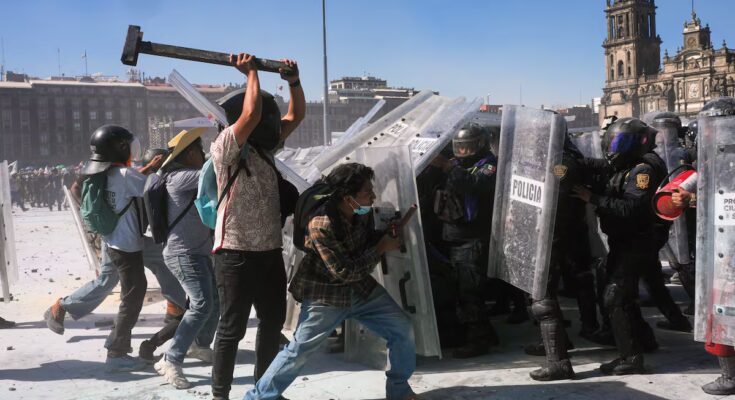The protests against Claudia Sheinbaum’s government, which shook Mexico City last Saturday and have been called again for November 20, were claimed by various actors and groups with different interests, including north of the border. In the United States, they have been targeted by some digital media and commentators from the Trumpian MAGA movement – such as Steve Bannon and Alex Jones, both known for spreading disinformation – for denouncing Mexico’s alleged transformation into a “narco-terrorist state”. In a context in which the United States has declared war on “narcoterrorism” in Latin America and has already sunk more than 20 alleged drug trafficking vessels in Caribbean and Pacific waters, resulting in at least 80 extrajudicial killings, the implication is clear: they are demanding that Mexico be the next target.
Donald Trump explained this to reporters at the White House on Monday, when asked if he would consider action in Mexico. “Stop the drugs? That’s fine with me. Whatever we need to do to stop the drugs… I looked at Mexico City over the weekend. There are big problems there. If we had to, would we do there what we did to the waterways? You know, there’s almost no drugs coming into our waterways anymore.” While Sheinbaum categorically rejects the idea of a direct American military incursion into Mexican territory, and Secretary of State Marco Rubio also rules out any unilateral action by the United States, interventionist rhetoric is growing among the president’s electoral base.
Some smaller, anonymous social media accounts have shared messages about it, but the majority of coverage of the Mexican protests within the MAGA ecosystem has been on Bannon and Jones’ agendas. Bannon’s War Room is among the 10 most listened to political podcasts, even though its content is more akin to a television news program, while Jones’ InfoWars website receives more than five million monthly visits, according to analytics firm Semrush. Both have been repeatedly sued for spreading false news, to the point that Jones was convicted and his official accounts were removed from numerous social media platforms. However, this does not appear to have had any impact on their audience, and their platforms directly influence public opinion within far-right sectors in the United States.
At this point, each side’s narrative sets the stage for US military intervention, albeit with different arguments. Jones, on the one hand, said that protests against Sheinbaum have spread across Mexico and that millions of Mexicans have united in what he calls a popular “revolution,” when the official attendance figure for Saturday’s demonstration was 17,000 people. According to his account, a US military incursion would be necessary to secure a transitional government allied with Trump.
In Bannon’s program, however, the contextualization is more exhaustive, underlining two things in particular: the generational component of the protests, initially attributed to Generation Z, even if they later expanded beyond that group; and the catalyst for dissatisfaction with Sheinbaum was the assassination of Uruapan mayor Carlos Manzo in Michoacán. In this case, the US intervention was presented as a direct demand by the Mexican population for Trump to act to remove the Sheinbaum government, supposedly under the direct control of the same “narcoterrorism” that victimizes Americans through the flow of drugs, particularly fentanyl.
Both versions are far from reality. Sheinbaum is one of the most popular leaders globally, with an approval rating close to 80%, and there is currently no existential risk to her government, although Manzo’s death, insecurity in several states due to cartel activity, and corruption scandals within her party are having a negative impact on public opinion. For his part, Trump says he is “not happy with Mexico,” despite the fact that security cooperation between the two countries has strengthened over the course of this year and the Sheinbaum administration has championed the fight against organized crime as a top priority.
In fact, the Mexican president’s message in response to questions about a possible US intervention lent a hand to further strengthen this collaboration. Sheinbaum expressed a firm refusal, given that US approval would be legally required for any military incursion into his country. The US Congress would also have to approve any attack or special operation in Mexico; President Trump said it would be easy to get support from lawmakers in both parties. Indeed, several Republican members of Congress have been advocating direct attacks on cartels for years, and some have reiterated this position, most notably Dan Crenshaw, a Texas Republican, who leads a legislative committee on fighting cartels.
Given the comments of Sheinbaum and Rubio, direct intervention on Mexican soil still seems like a distant possibility. But the domestic political context in the United States could fuel a scenario in which attacking Mexico is presented as a relatively easy way for Trump to score points with his base.

As the saga surrounding the Jeffrey Epstein documents nears its climax, requiring only the president’s signature for their public release, and as various rifts within the Republican base continue to deepen, a direct attack on cartels in Mexico is a measure with broad support within the party and among its voters that could both capture public attention and attract a significant portion of Trump supporters. While there are no recent polls on the topic, a Reuters poll conducted in 2023 — when Joe Biden was president and the fentanyl epidemic was at its peak — found that 64% of Republicans supported sending troops to Mexico to fight the cartels. The party’s near-unanimous support for recent attacks on suspected drug-trafficking vessels suggests the figure may now be even higher.
While Trump did not accuse Sheinbaum of being connected to or belonging to drug trafficking groups, as he did with the presidents of Venezuela and Colombia, Nicolás Maduro and Gustavo Petro, respectively, he said he would be “proud” to attack the cartels directly. “I’ve talked to Mexico, they know how I feel. We’re losing hundreds of thousands of people to drugs. We’ve blocked the waterways, but we know every route. We know every route, we know the addresses of every drug lord,” he said on Monday, despite there being no evidence that the attacks on drug boats have impacted the supply of drugs in the United States.
“We know their address, we know their front door. We know everything about every one of them. They’re killing our people. It’s like a war. Would I do it? I’d be proud,” Trump said. The foundations for a military intervention, prepared by the MAGA universe and by Trump himself, have been laid. The end result is less clear.
Sign up to our weekly newsletter to get more English-language news coverage from EL PAÍS USA Edition



